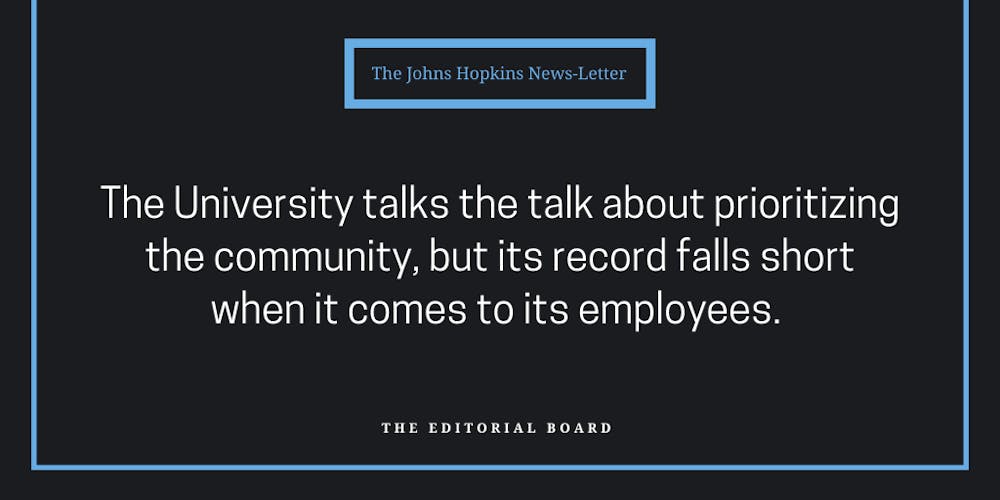While Hopkins boasts a “tradition of employment excellence,” recent protests demonstrate that current employees disagree with that assessment.
On Oct. 25, the unofficial graduate student union Teachers and Researchers United (TRU) gathered on Keyser Quad to call for fair wages and to hold a union card drive. Employed graduate students have argued they do not receive a living wage, due to inflation and the increasing cost of living.
The University can decide to formally recognize TRU as a union at any moment based on evidence of majority support, and doing so would strengthen the relationship between Hopkins and its graduate students.
On Nov. 3, food service workers protested in front of the Homewood Campus for job security. Represented by the Unite Here Local 7 union, dining employees have been negotiating a contract with the University since December.
This past summer, the University switched from its dining vendor, Bon Appetit Management Company, to a self-operated model. As a result, food service workers are now officially Hopkins employees, but they haven’t been afforded the same job security as they had under Bon Appetit.
In its contract with Unite Here Local 7, Bon Appetit was prohibited from contracting out work or using temporary agency workers. Now that food service workers are Hopkins employees, the union aims to secure the same guarantee from the University. Otherwise, their employment hangs in the balance.
We support the University’s switch from Bon Appetit to in-house dining operations. This semester, students have noted an improvement in the dining halls' food quality and diversity. However, Hopkins must carry out this decision with integrity, prioritizing the protection of and clear communication with its employees.
Though disappointing, the University’s employment practices aren’t exactly surprising. At the start of the COVID-19 pandemic, Hopkins enacted austerity measures that included halting employer retirement contributions for a year and furloughing nearly all of its 200 food service workers. However, after union negotiations, furloughed employees were able to secure a one-time relief payment equivalent to four weeks of pay.
Hopkins should continue to cooperate with the union, as the job insecurity food service workers currently face can have significant consequences. There is a high association between job insecurity and negative mental health outcomes. Contrary to the belief that job insecurity motivates workers to perform better, a Harvard Business Review study found that job insecurity makes workers more likely to break company rules and policy.
The University talks the talk about prioritizing the community, but its record falls short when it comes to its employees. As the largest employer in the state of Maryland, the University has the potential to set an example of labor standards. To start, Hopkins should ensure that its workers have fair wages and job security.
We rely on graduate students and food service workers every day, whether in the lecture hall or at the Hopkins Cafe. The News-Letter, as it did last November, calls on the University to build trust and increase transparency with its employees. They are an integral part of our community and deserve to be treated as such.





